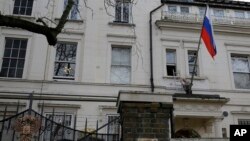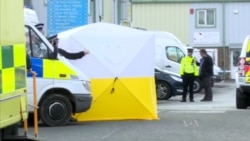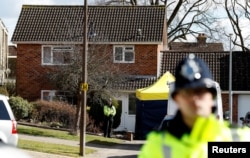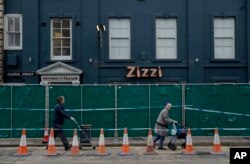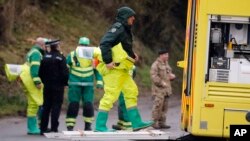Britain announced a raft of reprisals against Moscow, including the expulsion of 23 Russian diplomats, after it shrugged off demands to explain how a deadly Soviet-era nerve agent came to be used in the English town of Salisbury to poison former Russian spy Sergei Skripal and his daughter, Yulia.
British Prime Minister Theresa May announced the retaliation to a packed House of Commons. She said her government will draft legislation to protect Britain from hostile state activity and will consider new anti-espionage measures. Her reprisals include: adopting Magnitsky-type amendments to sanctions legislation allowing it to freeze assets of Russians deemed to be human rights abusers, and suspending all high-level contacts between Britain and Russian, including a planned visit by Russian foreign minister Sergey Lavrov.
WATCH: May on expulsions
The Russians being expelled have a week to leave in what is the largest expulsion of Russian diplomats since 1971, at the height of the Cold War. May said Russia's response to British allegations of Kremlin involvement in the poisoning “has shown complete disdain” and Moscow had offered no explanation for the Russian-made Novichok nerve agent used in the attack.
Russia has denied involvement in the poisoning and its foreign ministry said May's remarks Wednesday constitute "an unprecedented, flagrant provocation that undermines the foundations of normal dialogue between our countries." It added that Russia's "response measure will not be long in coming."
May said Moscow had treated the affair with “sarcasm, contempt and defiance.” She clashed with Labor leader Jeremy Corbyn, who questioned the lack of multilateralism in her approach, but the Prime Minister received broad support across party lines including from Labor lawmakers.
Shortly before May spoke NATO issued a statement expressing “deep concern at the first offensive use of a nerve agent on Alliance territory since NATO’s foundation.”
US reaction
The White House issued a statement Wednesday that said the U.S. "stands in solidarity with its closest ally, the United Kingdom" and shares in the assessment "that Russia is responsible for the reckless nerve agent attack on a British citizen and his daughter, and we support the United Kingdom’s decision to expel Russian diplomats as a just response.
"This latest action by Russia fits into a pattern of behavior in which Russia disregards the international rules-based order, undermines the sovereignty and security of countries worldwide, and attempts to subvert and discredit Western democratic institutions and processes," the statement continued.
British officials told VOA that Britain will build to the unleashing of an economic war against Russian leader Vladimir Putin and his coterie of Kremlin officials and oligarchs, with asset freezes and the seizing of property they own in London alongside visa bans against named Russian individuals.
Targeting Kremlin-tied assets
The British prime minister is pressing international allies to follow Britain’s example and to turn the spotlight on the billions of dollars of Kremlin-tied assets around the world.
But officials say even British targeting alone will cause some pain to Russians linked to the Kremlin, who under the plans being drawn up will have property and assets seized, if they cannot show their holdings come from ‘legitimate’ sources. British officials have powers under criminal finance legislation to start moving on Russian assets.
“The overall impact of what we are planning to do, will have serious repercussions for Russia,” a senior British official told VOA.
May had given an ultimatum to the Kremlin to explain the poisoning. But the deadline passed on Tuesday night with Russia saying there would be no official response until Britain had provided a sample of the toxin and pursued the investigation through the ‘proper channels’ of the Organization for the Prohibition of Chemical Weapons (OPCW), of which both Russia and the British are signatories.
Another death
Further impetus for Britain's reprisals against Russia came Tuesday when British police said they had opened an investigation into the “unexplained” death on Monday of Putin critic Nikolai Glushkov, a former adviser to Boris Berezovsky, the deceased Russian oligarch and fierce Putin rival. Glushkov, who the Kremlin had demanded be extradited to Moscow, was found dead at his London home just eight days after the poisoning of the Skripals.
Media reports in London suggest he may have been strangled.
Public anger toward Russia also has increased amid warnings that hundreds of people in the town of Salisbury are in danger from the nerve agent, Novichok, that was used to poison the Skripals. A former Russian scientist who helped develop the nerve agent in Soviet-era chemical warfare laboratories says people who may have been exposed to even small amounts of the military-grade toxin will face health risks for the rest of their lives.
Describing Novichok as “very nasty stuff,” scientist Vil Mirzayanov, a chemist who ran the technical counter-intelligence department in Russia's chemical weapons institute, told Britain’s Sky News it was developed as a “weapon of mass murder.”
Health risks
Speaking from his home in Princeton, New Jersey, Mirzayanov said, ”It’s the same as nerve gas but 10 times, at least 10 times, more powerful.” He said the agent was designed to wreck the human body and do “irreparable” damage, saying the Skripals would be left as “invalids."
Mirzayanov also said serious long-term health risks remain for hundreds of Salisbury residents who may have been exposed to trace contamination because of their proximity as the attack unfolded, or who brushed past the Skripals in a pub and a restaurant they visited. Asked about the advice given by British public health officials, including washing clothes and wiping down possessions, he said, “Sure, it's useful, but not enough, absolutely not.”
British health officials say “the risk to the general public is low.” But their comments aren’t reassuring, say locals, who are seeing increasing numbers of police and army specialists clothed in protective suits deployed in the town of 40,000.
The Skripals meanwhile remain hospitalized in critical condition.




